Stead Surname Ancestry ResultsOur indexes 1000-1999 include entries for the spelling 'stead'. In the period you have requested, we have the following 685 records (displaying 431 to 440): Single Surname Subscription | | | Buying all 685 results of this search individually would cost £3,864.00. But you can have free access to all 685 records for a year, to view, to save and print, for £100. Save £3,764.00. More... |
These sample scans are from the original record. You will get scans of the full pages or articles where the surname you searched for has been found. Your web browser may prevent the sample windows from opening; in this case please change your browser settings to allow pop-up windows from this site. Long-stay Paupers in Workhouses: Carlton
(1861)
This comprehensive return by the Poor Law Board for England and Wales in July 1861 revealed that of the 67,800 paupers aged 16 or over, exclusive of vagrants, then in the Board's workhouses, 14,216 (6,569 men, 7,647 women) had been inmates for a continuous period of five years and upwards. The return lists all these long-stay inmates from each of the 626 workhouses that had been existence for five years and more, giving full name; the amount of time that each had been in the workhouse (years and months); the reason assigned why the pauper in each case was unable to sustain himself or herself; and whether or not the pauper had been brought up in a district or workhouse school (very few had). The commonest reasons given for this long stay in the workhouse were: old age and infirm (3,331); infirm (2,565); idiot (1,565); weak mind (1,026); imbecile (997); and illness (493). STEAD. Cost: £6.00.  | Sample scan, click to enlarge

| Long-stay Paupers in Workhouses: Wakefield
(1861)
This comprehensive return by the Poor Law Board for England and Wales in July 1861 revealed that of the 67,800 paupers aged 16 or over, exclusive of vagrants, then in the Board's workhouses, 14,216 (6,569 men, 7,647 women) had been inmates for a continuous period of five years and upwards. The return lists all these long-stay inmates from each of the 626 workhouses that had been existence for five years and more, giving full name; the amount of time that each had been in the workhouse (years and months); the reason assigned why the pauper in each case was unable to sustain himself or herself; and whether or not the pauper had been brought up in a district or workhouse school (very few had). The commonest reasons given for this long stay in the workhouse were: old age and infirm (3,331); infirm (2,565); idiot (1,565); weak mind (1,026); imbecile (997); and illness (493). STEAD. Cost: £6.00.  | Sample scan, click to enlarge

| Members of the Royal Agricultural Society of England
(1861)
The list of members of the Royal Agricultural Society gives names and addresses: life members are indicated by a dagger. (The names of 60 members were omitted on account of their subscriptions to the society being in arrear to 31 December 1859). This list is correct to June 1861; as of 11 December of that year there were 84 life governors, 95 annual governors, 1124 life members, 3399 annual members and 17 honorary members, making a total of 4719 names, mostly of landowners and agriculturists.STEAD. Cost: £4.00.  | Sample scan, click to enlarge

| Patentees of New Inventions
(1861)
Abstracts of British patents for new inventions applied for and granted from 1 January to 31 December 1861: giving date, name and address, and short description of the invention. It is then stated whether 'Letters patent sealed' or 'Provisional protection only'.STEAD. Cost: £6.00.  | Sample scan, click to enlarge
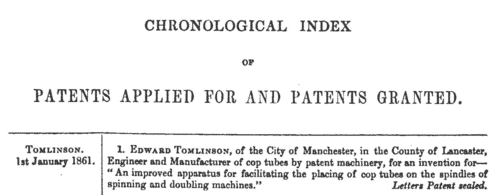
| Women Students Entering Stockwell Teacher Training College
(1861)
This list, revised to August 1908, gives the student's name and her then address (if known); the Remarks column indicates whether she left the course early; left the profession; went abroad; died; became a headmistress; and/or married: married name is often given. STEAD. Cost: £4.00.  | Sample scan, click to enlarge

| Boys entering Giggleswick School
(1862)
The school at Giggleswick in the West Riding of Yorkshire dates from at least 1507, but no register of the boys attending there has survived earlier than one started by the headmaster, the reverend George Style, in 1875. When the bursar, H. L. Mullins, prepared this, 'The Giggleswick School Register', printed in 1913, he was able to compile general details of some scholars from earlier years, but the concerted, reasonably complete, account starts in 1859. The details are arranged by term of entry, then alphabetically by surname and christian name. Typically each description gives full name; date of birth; name and address of father; date of leaving. Where known, Mullins then added a brief career synopsis, present address in 1913, or date of death.STEAD. Cost: £4.00.  | Sample scan, click to enlarge
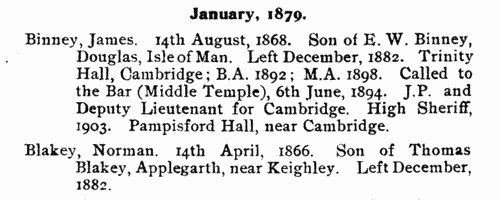
| Boys entering Leeds Grammar School Lower (Commercial) Department
(1863)
The admission books for Leeds Grammar School from 1820 to 1900 were edited by Edmund Wilson and published in 1906. The series of registers is almost complete for the period, there being in addition admission registers for the Lower (or Commercial) Department from 1856 to 1865, and lists of boys in the school in 1856, and in the Commercial Department in 1861. The entries are arranged by date or term of admission: a sequential number is given first, then surname, christian name, and, after a dash, father's christian name, occupation, and address; another dash, and then the age of the boy at admission, and often his year of leaving (with the abbreviation r. for 'removed' or 'left'). r.* means left without notice; (o) or S. or Stranger or Foreigner indicates a boy not on the foundation. The editor was unable to divine the meaning of the abbreviation (Q) or the asterisks prefixed to most entries in 1856 to 1860, but dutifully copies them into the text. In smaller type he then proceeds, where possible, to add some information about the boy's subsequent career.STEAD. Cost: £4.00.  | Sample scan, click to enlarge
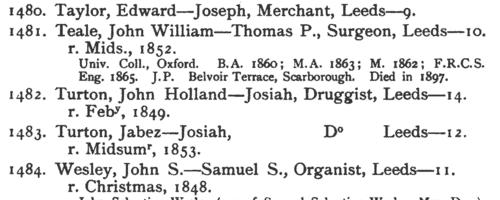
| Missionaries and contributors
(1863)
The Evangelical Magazine and Missionary Chronicle records the work of Christian missionaries throughout the world, and of the supporting missionary societies collecting money for the work in the British Isles. Contributions are listed by congregation, and by family members making donations.STEAD. Cost: £8.00.  | Sample scan, click to enlarge
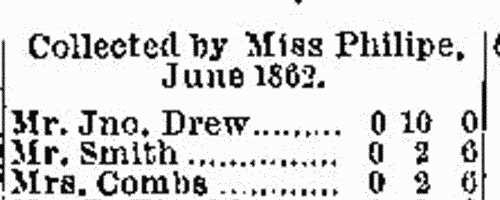
| Missionaries and contributors
(1864)
The Evangelical Magazine and Missionary Chronicle records the work of Christian missionaries throughout the world, and of the supporting missionary societies collecting money for the work in the British Isles. Contributions are listed by congregation, and by family members making donations.STEAD. Cost: £8.00.  | Sample scan, click to enlarge
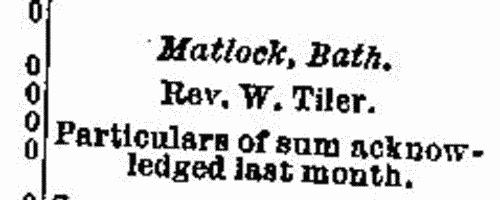
| Dublin Electors
(1865)
This alphabetical list of electors for the City of Dublin for 1865 is annotated with details of the votes cast in the election of 15 July 1865 for a member of Parliament. The candidates were John Vance, Esq., D. L. (V), Benjamin Lee Guinness, Esq., D. L., LL. D. (G), and Jonathan Pim, Esq. (P). The first column gives, in bold, the initial of the ward in which lay the property that was the elector's qualification. The second column gives the elector's sequential number (alphabetically) within that ward. Then the elector's full name is given, surname first, and address, usually including house number. The votes cast are shown on the right: where these columns are blank, the elector did not vote. The key to the ward names is: A, South Dock; B, Donnybrook; C, Rathdown; D, Trinity; E, South City; F, Royal Exchange; G, Mansion House; H, Fitzwilliam; I, Wood Quay; K, Merchants' Quay; L, Usher's Quay; M, Arran Quay; N, Inns' Quay; O, North City; P, Rotundo; Q, Mountjoy; R; North Dock. S indicates the register of freemen.STEAD. Cost: £4.00.  | Sample scan, click to enlarge
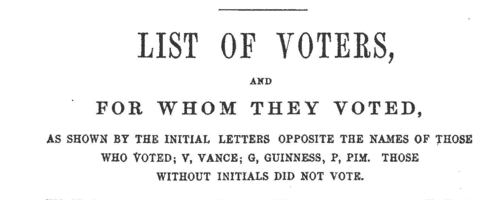
|
Research your ancestry, family history, genealogy and one-name study by direct access to original records and archives indexed by surname.
|












